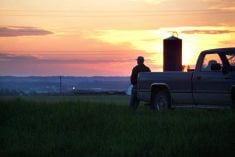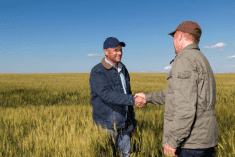CAN I SURVIVE IF I DON T GET BIG?
Yes. In fact, the time is ripe to develop a sustainable business plan for a small-to medium-sized farm, these economists say. The catch is, you ll need to get off the commodity treadmill.
Kohl foresees three distinct categories of farms. On the one end, large corporate farms will be mostly owned and operated by families. On the other, successful small operations will prosper by using savvy marketing to get premiums from value-added, niche or local sales.
Read Also

The big squeeze: How to be fair to siblings during farm succession
Managing sibling business relationships on family farms.
In between, mid-sized family-owned farms will survive, providing they make it through the decade s succession purge. But this will be an uneven category, with both winners and losers.
Fortunately, with a combination of determination and shrewd business management, it will be possible to make them profitable. The mid-sized farm will exist in 2020, although there will be fewer, says Kohl. Their focus will be a better is better instead of bigger is better strategy.
By better, Kohl means that these farms will be highly efficient, they ll produce quality products and they ll balance business with their lifestyle. (See related stories starting page 17.)
Meanwhile, there will be myriad opportunities for small farms. The sea change in farm attitudes is already underway, our economists say. Even within traditional ag circles, small farms are attracting a whole new level of respect.
In part, that s because small farm doesn t have to mean small revenues. In fact, many small-acreage farms generate more income than their much larger commodity-based counterparts.
Kohl is an example. He is one of four partners in Homestead Creamery, a Virginia farm business that produces premium milk in recycled glass bottles plus high-energy ice cream and other differentiated dairy products. On average, Homestead Creamery delivers $20 of dairy and local products weekly to each of 1,400 households.
People want to experience the farm the smells, the feel, the touch of their food, Kohl says.
Nor do small farms have to be on Calgary s or Toronto s doorstep. Opportunities for value-added, niche and specialty products exist wherever there s a farm.
If you do farm small, however, it s essential to see it as a business. Be entrepreneurial, and make a point of studying and learning from successful small farms, Kohl recommends. If you want that business model, go to Europe because they re about 10 years ahead of us.
WHERE WILL WE FIND YOUNG FARMERS?
They will find you. In fact, it may be the ideal time to be in your 30s or early 40s and be hungry to farm.
An estimated 20 per cent of farms don t have a next generation that wants to take over. For many others, succession is a looming decision that threatens to turn into a crisis because it isn t being managed.
Even on farms that are talking succession, it s a different discussion than ever before, for two reasons. That s because Mom and Dad can expect to live longer, and they want to plan for a long, independent retirement.
It s also different because children are deciding whether to stay or go based on whether they ve got a passion for farm business. They aren t following anyone s footsteps.
That s as it should be, Mason says. The good news is that because of long-term market fundamentals, those who have farming in their bones will be able to project a healthy, profitable future. It won t always be a bed of roses but, says Mason, There will be positive returns. There is a lot of good news on the horizon.
Mason predicts that today s parents should also be alert for a wave of non-farmers who are looking for ways to get their start.
It s a different age. It doesn t matter what job you look at, children don t do what their parents did, Mason says. We re going to see a lot of interest in farming as a career choice by people who aren t born on the farm.
The challenge is for the existing farmer and the new farmer to work out how to transfer assets. It really is a bridge financing issue, says Mason. In fact, he believes governments may get involved too, much as they are already involved in guaranteeing student loans and even personal mortgages through the Canadian Mortgage and Housing Corporation.
Meanwhile, whether they re homebred or whether they come from off the farm, this new generation of young farmers will find that enough retiring farmers are putting enough land and facilities onto the market to give them options to build successful farm businesses.
Many, however, may decide they never actually need to own those assets. Sparling points to what he calls a mentality for non-ownership in in the U. S. More farmers there are building business models based on food production, Sparling says, leaving it to investment companies to buy and lease the land.














